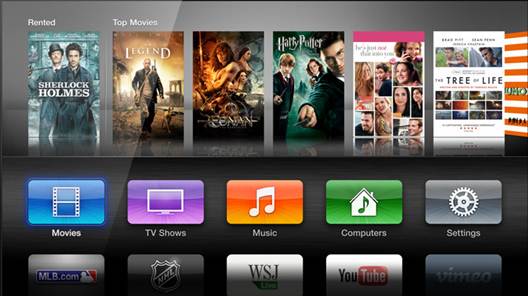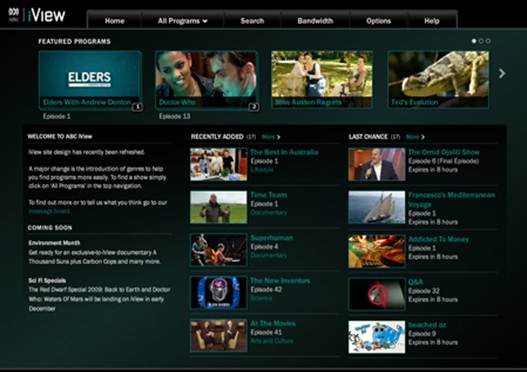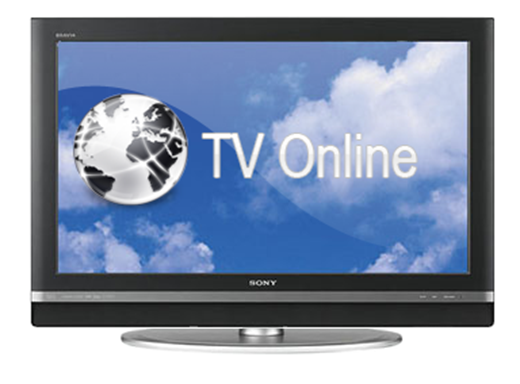If you’re planning a big night in, an
online movie rental service could be just the ticket.
These days you’ll find movie rental
services built into just about every lounge room gadget, plus some rental
services also run in a browser. Prices are similar to the video store - around
$6 for an overnight rental and perhaps a dollar more for a high-def version.
Some services also let you purchase movies as digital downloads.
The ability to click on a movie and start
playing within a few minutes is helping win people back from BitTorrent. The
big names are Apple and BigPond, offering rentals via the Apple TV and T-Box
respectively. Fetch TV offers a growing movie rental service and Foxtel is also
a contender, having introduced internet video features to its iQ2 PVR to sit
alongside its existing pay-per-view options.

The
big names are Apple and BigPond, offering rentals via the Apple TV and T-Box
respectively.
Apple has recently made it harder for
Australians to create US iTunes accounts, but if you do you’ll get access to
movies a little cheaper and a lot sooner (without the need for a VPN or US
credit card). A VPN will also let you tap into movie rentals from the likes of
Amazon, Netf lix and Vudu via other gadgets, but you might need a US credit
card to seal the deal.
Before you hand over cash for yet another
lounge room player, it’s worth checking the gear you already own. Both the
PlayStation 3 and Xbox 360 feature movie rental services as well as Quickflix
support. The TiVo PVR features the CASPA movie service. Meanwhile BigPond
Movies and Quickflix are built into a growing range of televisions and Blu-ray
players, plus Sony adds Mubi and its own Video Unlimited service. Quickflix
and Mubi also offer all-you-can-eat subscription movie services, although the
range of titles is still rather limited compared to pay-per-view options.
If that’s not enough to keep you
entertained, Google also offers movie rentals in Australia via YouTube and the
Google Play store. These let you watch movies in a browser or on an Android
device. Android hardware makers such as HTC and Samsung pre install movie
rental software on some gadgets, while iGadget owners can rent movies directly
from iTunes.

If
that’s not enough to keep you entertained, Google also offers movie rentals in
Australia via YouTube and the Google Play store.
Purists with a big television and an eye
for detail will notice that online rentals still struggle to match the picture
quality of DVD and Blu-ray. If you’ve got a surround sound system it’s worth
noting that standard-def online rentals are usually limited to 2-channel stereo
sound, unlike 5.1-channel sound on DVD. Some high-def downloads feature
5,1-channel sound, but you’ll probably get 7.1-channel sound on the Blu-ray
version (if your home theatre supports it).
Just like your CDs, you can rip your DVD
and Blu-ray collection using software such as AnyDVD HD and Handbrake. Right
now Australians are permitted to rip music but not movies, although this could
change with next year’s review of copyright law.
When it comes to rentals, Quickflix will
post rental discs out to you with a reply paid envelope. BigPond stopped
sending out discs in the post last year and sold those customers off to Quickf
lix.
Television
Why let Australia’s TV Networks Jerk
you around when you can find your favourite shows online?
Australia’s free-to-air j A , broadcasters
treat viewers with such contempt that we’ve been some of the world’s most
ardent BitTorrent users. These days all five of Australia’s major free-to-air
broadcasters offer a free online Catch Up TV service, as do Foxtel and Austar
for their subscribers.
The ABC’s iView is by far the most
impressive of the free local offerings. You’ll also find live streams of ABC
News 24 and some SBS programs, plus a range of content from the likes of
Yahoo!7, N1neMSN and BigPorid. The BBC has also released an Australian
subscription TV app for iGadgets with some free content.

The
BBC has also released an Australian subscription TV app for iGadgets with some
free content.
Of course online video extends far beyond
the major broadcasters and you’ll find a range of content ranging from TED,
Wired and Livestrong to Machinima, The Onion and CollegeHumour. Whatever your
interest, there’s an online video service or vodcast for you.
Most online video services are Flash-based
and run in a browser, but they’re also coming to a growing range of home
entertainment devices and handheld gadgets. Unfortunately Catch Up content
varies greatly, for example you won’t find nearly as many programs if you’re
watching the Seven Network’s Plus7 on a Blu-ray player rather than watching it
in a browser.
Recent episodes are generally removed from
Catch Up services after a few weeks. If you’re looking to revisit the classics,
then Apple’s ¡Tunes or Telstra’s T-Box could be a better option. iTunes even
offers a discount if you buy an entire season, often working out cheaper than
buying the series on disc.
Before you hand over the cash, remember
you’ll also find some old TV shows on Catch Up services as well as Quickflix,
Fetch TV, BigPond Movies, YouTube and Fairfax’s St1H T\ To be honest, a quick
Google search will find a streaming version of pretty much any show you want to
watch (although once again you’re on shaky legal ground).
Despite talk from Freeview, there’s no sign
of a central Catch Up service. For now Australians look on with envy at
impressive foreign services such as 1-fulu and BBC iPlayer. But you can tap
into such services, along with extra YouTube content, by using a proxy server
or Virtual Private Network to mask your location. You’ll find a range of free
and subscription services online, but some don’t offer fast enough download
speeds to support smooth streaming video. Some are also blocked by certain video
services, but there are usually workarounds.

Despite
talk from Freeview, there’s no sign of a central Catch Up service.
If you want to use a VPN, you’ll need to
consider how you’ll connect it to your playback device, A handful of gadgets
such as D-Link’s Boxee Box will run a VPN client (you can also run Boxee on a
tablet, but they’ve discontinued support for PCs). Alternatively you could set
up a separate home Wi-Fi network for times when you want to switch locations. Another
option is to consider a DNS-based service such as Unblock-Us.com, which should
work with any application or device which lets you manually configure your DNS
settings.